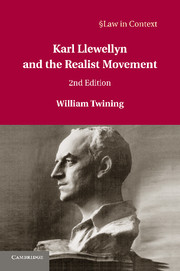Book contents
- Frontmatter
- Contents
- Foreword
- Preface
- Postscript
- Acknowledgements
- Abbreviations
- Part I The Rise of the Realist Movement 1870–1931
- Part II The Life and Work of Karl Llewellyn: A Case Study
- Part III Conclusion
- Appendices
- Appendices A The War Adventure
- Appendices B A Restatement of Llewellyn's Theory of Rules
- Appendices C Extracts from Law in Our Society
- Appendices D Llewellyn's Later Interpretations of Realism
- Appendices E Two Documents on the Uniform Commercial Code
- Appendices F The Pueblo Codes
- Bibliography
- General Index
Appendices B - A Restatement of Llewellyn's Theory of Rules
from Appendices
Published online by Cambridge University Press: 05 December 2012
- Frontmatter
- Contents
- Foreword
- Preface
- Postscript
- Acknowledgements
- Abbreviations
- Part I The Rise of the Realist Movement 1870–1931
- Part II The Life and Work of Karl Llewellyn: A Case Study
- Part III Conclusion
- Appendices
- Appendices A The War Adventure
- Appendices B A Restatement of Llewellyn's Theory of Rules
- Appendices C Extracts from Law in Our Society
- Appendices D Llewellyn's Later Interpretations of Realism
- Appendices E Two Documents on the Uniform Commercial Code
- Appendices F The Pueblo Codes
- Bibliography
- General Index
Summary
INTRODUCTION
This is an attempt to assemble in one place some of Llewellyn's most important general statements about legal rules, their nature, their functions, their place in the institution of law-and-govern-ment, the values and dangers of making them the sole or main focus of attention, their role in American state appellate judicial decisions, and the kinds of rules which he considered to be the most desirable. It is only a ‘theory’ in the loose sense of a reasonably coherent collection of thoughts about a topic; these thoughts include some conceptual analysis, some broad factual generalizations, and some value judgments and recommendations.
Two principal sources have been used in this restatement: the manuscript of an unfinished book on The Theory of Rules and The Common Law Tradition, supplemented by a few passages from earlier writings. The manuscript is undated, but internal evidence suggests that it was probably written at some time during the period 1938–40 concurrently with or shortly before the preparation of the Storrs Lectures on ‘The Common Law Tradition’. Most of what follows consists of verbatim quotations; where, for the sake of brevity or clarity, Llewellyn's own words have been paraphrased, references to relevant passages supporting this interpretation are given.
‘RULE’ AND ‘RULES OF LAW’
(i) ‘Rule’
(a) ‘A first working description of a rule could be: a form of words built to further the continuing organization and government of human conduct’ (New Bramble Bush, ch. III, i).
[…]
- Type
- Chapter
- Information
- Karl Llewellyn and the Realist Movement , pp. 544 - 552Publisher: Cambridge University PressPrint publication year: 2012



